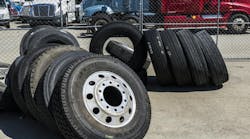Imports of truck and bus tires from Thailand have more than doubled between 2020 and 2022, according to the United Steelworkers, which filed an antidumping petition on Thai truck and bus tires last October. With current dumping margins as high as 47.8%, USW said this is “enabling imports to undercut domestic producers and imperil U.S. jobs.” USW previously filed a similar petition over Chinese tires, which led to antidumping and countervailing duties put in place since 2018.
In November, the International Trade Commission stated, “There is a reasonable indication that a U.S. industry is materially injured by reason of imports of truck and bus tires from Thailand that are allegedly sold in the U.S. at less than fair value.” The preliminary ITC report released in December painted a troubling picture for domestic truck tires.
The ITC investigation uncovered consistent underselling by subject imports ranging from 1.6% to 72.4%, resulting in 5.3 million tires sold for less than fair market value. Therefore, ITC concluded that the imported Thai tires had “significant price effects” on the U.S. truck and bus tire market. ITC expects to release a preliminary antidumping duty determination in late March that will likely result in tariffs and duties like those placed on Chinese truck tires.
Domestic tire manufacturers accounted for 46.4% of truck and bus tire consumption in the U.S. in 2020, according to ITC. Subject imports from Thailand were 19.5%, and non-subject imports from Vietnam, Japan, China, Canada, and South Korea represented 34.1% of U.S. consumption. In 2021, domestic market share dropped to 41.1%, subject imports rose to 24.2%, and non-subject imports rose slightly to 34.7%. It was similar in 2022, with domestic market share dropping to 33.9%, imports from Thailand increasing to 28.3%, and non-subject imports rising to 37.9% of U.S. consumption.
See also: Rohlwing: There's no substitute for natural tire rubber, so focus on conservation
What’s most concerning is that domestic consumption dropped from 46.4% to 33.9% in just three years. Other domestic manufacturing industries have experienced similar levels of offshoring. However, a 12.5% drop from 2020 to 2022 indicates that tire supplies here are too dependent on imports.
We have seen what can happen in the semiconductor industry when a domestic market becomes too dependent on offshore manufacturing. U.S. computer chip manufacturers accounted for about 37% of the global supply in 1990. That number shrank to about 12% by 2020, with Taiwan, South Korea, Japan, and China accounting for 73% of global manufacturing. When the pandemic caused significant microchip shortages, it crippled countless industries. It spurred Congress to pass the CHIPS Act, which offers billions of dollars in incentives for companies to build new microchip fabrication plants in the U.S.
Although you might think the supply chain lessons learned during COVID would change consumer spending, the current economy makes that unlikely. Every financial decision is influenced by price, so it comes as no surprise that more fleets are turning to Thailand for ultra-cheap truck tires. However, unlike semiconductors, truck tires cannot be loaded on a plane and flown to the U.S. Recent backups at the Panama Canal and conflicts in the Red Sea demonstrate the fragility of the ocean freight system.
If below-fair-value manufacturers continue operating in the U.S., domestic capacity for new-truck tire production will decline as companies shift production to other countries where wages, taxes, and environmental regulations reduce costs. It happened with semiconductors not too long ago, and the consequences were most severe in the auto and consumer electronics industries. We survived without an abundant supply of new cars, computers, and smartphones, but a truck tire shortage of the same magnitude would be a different story.
A level playing field allows domestic and imported truck tires to compete equally in performance, retreadability, and cost. Let’s hope the tariffs on tires manufactured in Thailand and sold for below fair value restore some balance to the market and preserve domestic manufacturing capacity.




